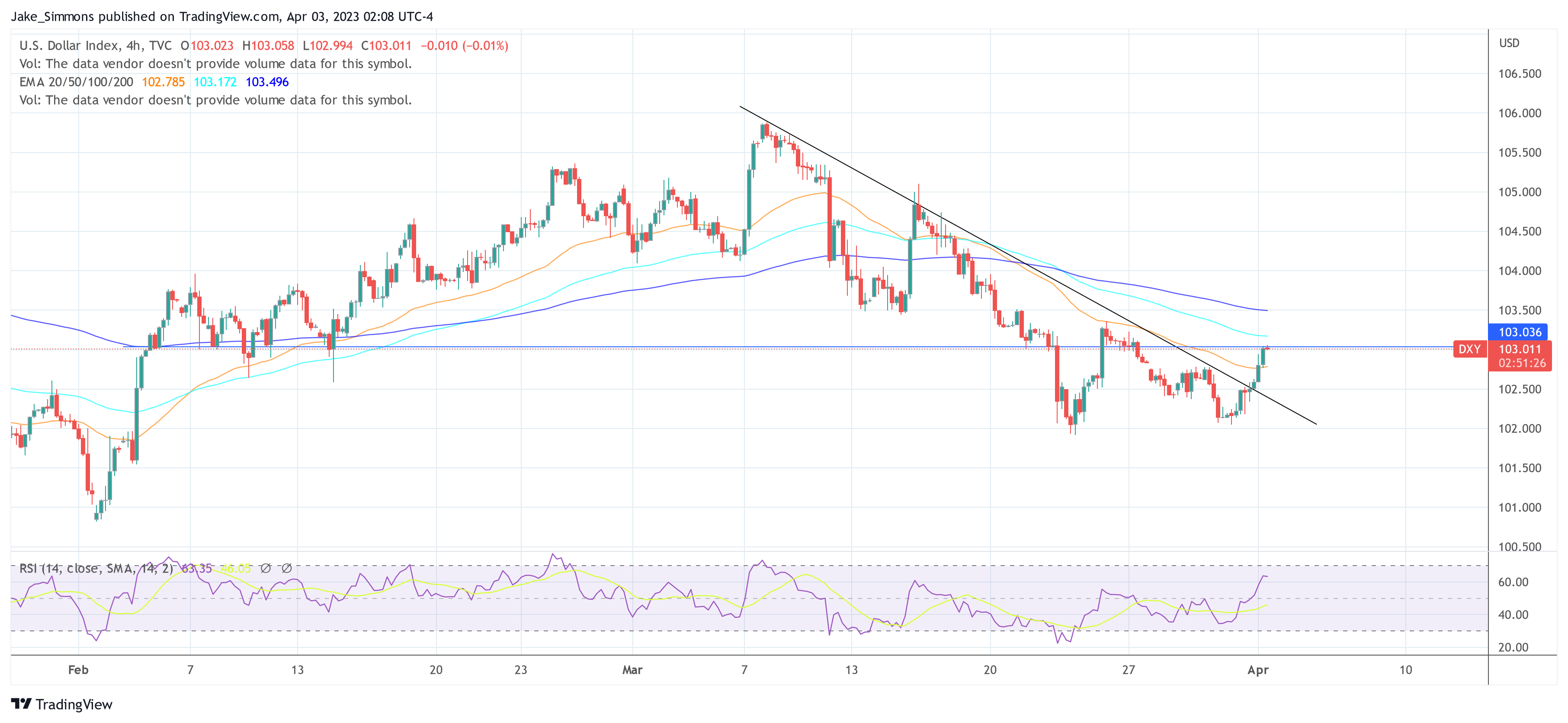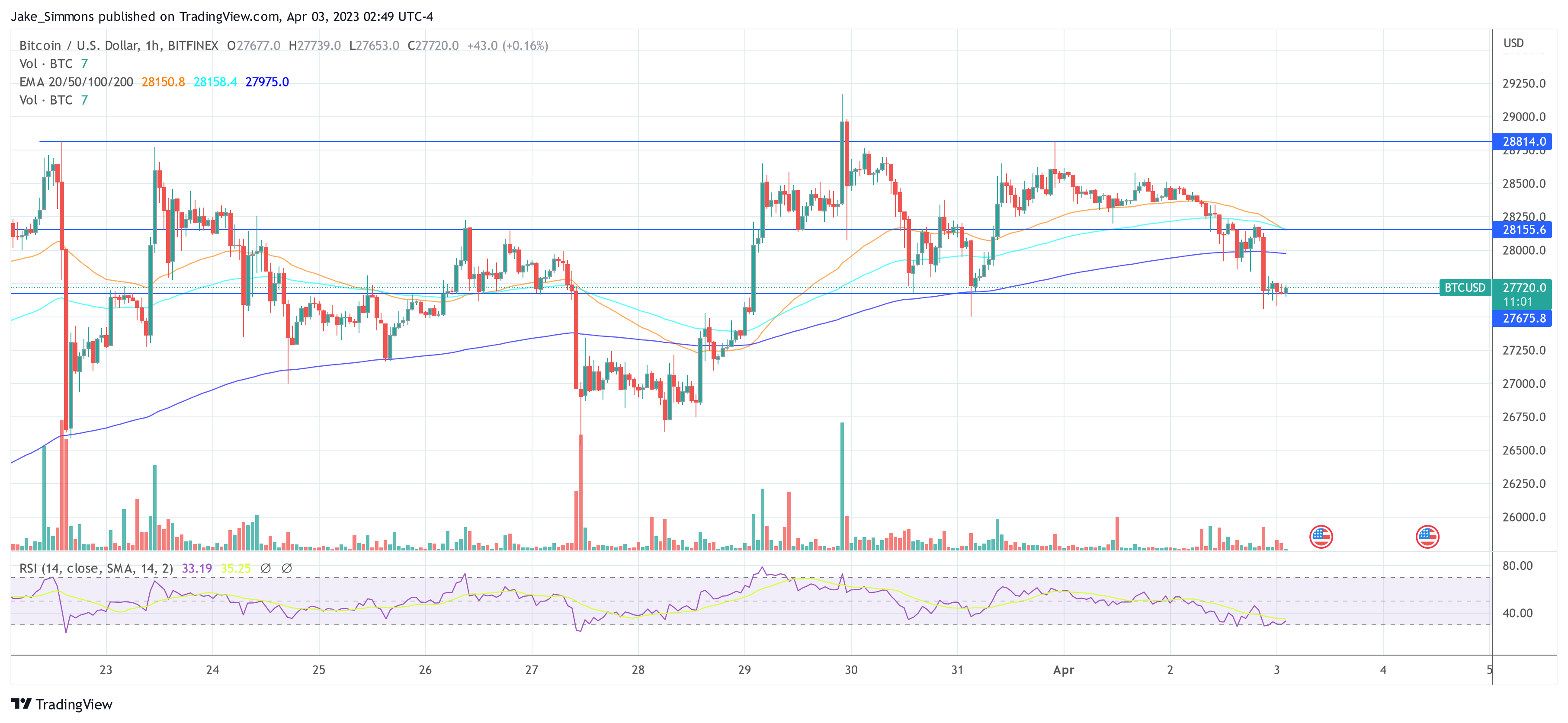The Bitcoin and crypto market saw a pullback at the start of the trading session in Asia. The price of BTC briefly fell 2.2% and initially stabilized above $27,700 at press time. The broader crypto market followed suit and is also in the red.
The reason for the slump in the price is probably the news that the members of the OPEC+ oil alliance announced a surprise cut in oil production on Sunday. Led by Saudi Arabia, which wants to produce 500,000 barrels per day less, production will be lower by a total of one million barrels per day from May.
As a result, the price of Brent crude oil rose more than $5 per barrel, or 7%, to more than $85 in early trading, potentially putting more pressure on inflation. As macro analyst Alex Krueger explained, there is a rule of thumb that a $10 increase in oil prices leads to a 0.2% increase in inflation.
As a rule of thumb a $10 increase in crude oil leads to a 0.2% increase in inflation and a 0.1% hit to growth
– Jerome Powell (Mar/2022)
— Alex Krüger (@krugermacro) April 3, 2023
As a result, the US dollar started the week higher. The inflation fears could lead to expectations that the Fed is not done after all and will have to raise interest rates in May – especially because U.S. President Biden has already tapped heavily into the Strategic Petroleum Reserve (SPR) in recent months.
Therefore, all eyes will likely be on the Dollar Index (DXY) on Monday. If the DXY continues to rise due to inflation and interest rate hike fears, it could be a significant headwind for Bitcoin and the entire crypto market.
A look at the 4-hour chart of the DXY shows that the index is breaking out of a downtrend. If this is confirmed, stocks and the broader financial market are likely to start the session in the red.

For Bitcoin, it is once again about showing resilience. Does Bitcoin fall towards the $25,000 mark because a rising oil price means more inflation and higher interest rates, or does it rise because this means that the Federal Reserve’s monetary policy will lead to more bank failures and renewed bank runs.
Key Macro Data For Bitcoin And Crypto
The trading week before the Easter holidays holds some macro data that may have an impact on Bitcoin and the entire crypto market. Today, Monday, the ISM Purchasing Managers’ Index (PMI) for the manufacturing sector in the United States will be released at 10:00 am EST.
For the month of March, experts expect a further weakening index at 47.5. In February, the index was already below the forecast of 48.0 at 47.7. In response, the DXY trended downward, while Bitcoin was able to benefit from the weakness of the US dollar index on this day.
On Tuesday, April 4 at 10:00 am EST, the JOLTS jobs report will be presented. The latest estimate is 10.40 million job openings, up from 10.82 million the previous month. If the US economy continues to prove strong (a number above expectations), US stock indices are likely to react positively. In recent months, the financial market reacted favorably to a resilient JOLTs report, something Bitcoin could also benefit from.
On Wednesday, April 5 at 10:00 am EST, the latest Purchasing Managers’ Indexes (PMI) for the US services sector will be released. February’s reading came in at 55.1, again above expectations (at 54.5). Consequently, the stock market as well as the crypto market were heading higher. If the estimate of 54.5 is exceeded once again, investors will likely continue to view this positively.
On Friday, April 7 at 8:30 am EST, the U.S. Bureau of Labor Statistics will publish the US Labor Market Report (NFP) and the latest US unemployment figures, despite the holiday and closed Wall Street. Expert estimates are for 213,000 new jobs created (down significantly from 265,000 jobs created in February).
Both data points could either fuel fears of a recession or mitigate them. In the latter case, it would be positive for both financial markets and Bitcoin. If the NFP forecast is beaten for the seventh consecutive month, a positive reaction in the financial markets can be expected. The US unemployment rate is predicted at 3.6%, after rising from 3.4% to 3.6% in February.
At press time, the BTC price was trading at $27,720, fighting to hold support at $26,670.





